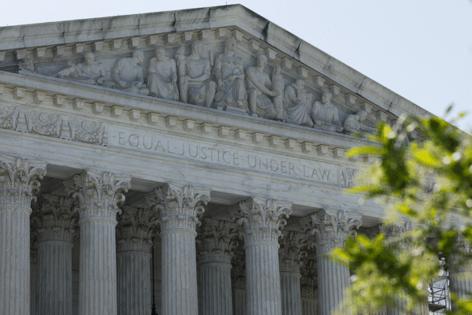Commentary: Tax dollars for religious schools? Conservative justices could be the roadblock
Published in Op Eds
In 1805, New York made a deal. State officials granted taxpayer funds and a corporate charter to a private organization known as the Free School Society, which agreed in return to provide a free education to poor children in New York City. Over the next decades, the society became a precursor to modern-day charter school networks that are prominent across California and the nation.
Other 19th century school organizations took notice, including religious ones. From 1825 until 1841, New York officials received similar requests for funding from Baptist, Jewish, Lutheran, Catholic, Presbyterian and Quaker schools. All were denied.
What happened next is remarkable. Not only did none of the religious schools win a lawsuit arguing that the denial of funding violated their constitutional right to free exercise of religion, but none even brought suit. And similar episodes unfolded around the country, in states such as California, Massachusetts, New Jersey and Illinois.
To many people, this two-centuries-old snapshot may seem quaint or even irrelevant. But to the Supreme Court of the United States, it is everything. It’s everything because the current court has deemed history and tradition to be central to the interpretation of our constitutional rights. And in a case to be argued on April 30, this history could determine the outcome of a major dispute that will determine whether billions of taxpayer dollars will be poured into schools that teach their preferred religious doctrines.
The case is Oklahoma Statewide Charter School Board vs. Drummond, and it presents the question whether the Free Exercise Clause of the 1st Amendment compels states with secular charter schools — which is nearly all states — to provide funds to religious charter schools as well. A ruling for religious schools would disrupt the public education system as we know it from California to New York — to say nothing of historic norms of church-state separation.
Given the court’s pro-religion majority, some have already portrayed the case as a likely moment of conservative triumph. Maybe so. But the case will also be an originalist moment of truth. That is because the most eye-opening aspect of the religious charter schools’ legal argument is its utter incompatibility with the originalist approach to constitutional interpretation that the court’s conservatives have applied in a slew of recent cases.
The most prominent of these history-focused rulings, of course, is Dobbs vs. Jackson Women’s Health Organization, which overturned Roe vs. Wade. In the Dobbs case, a five-justice majority held that history did not support a right to abortion because when states prohibited abortion in the antebellum period, “no one … argued that the laws they enacted violated a fundamental right.” (One of us has argued elsewhere that Dobbs misrepresents the history of abortion, but that is water under the bridge.)
If the logic from Dobbs is sound, then the same argument ought to doom the religious charter schools’ position in Drummond. As we show in a forthcoming paper, episodes like the one involving New York’s Free School Society were ubiquitous: States in the antebellum period routinely denied funding requests from religious charter schools, and no one — not even the religious schools themselves — argued that these denials violated a state or federal right to free exercise as originally understood.
The absence of any litigation asserting a free exercise right to religious school funding is especially jarring given that religious communities at the time were busy bringing (and winning) other free exercise lawsuits, such as a prominent 1813 case recognizing a right for a Catholic priest to refuse to testify about a confessional. The only conclusion that makes historical sense is that founding-era religious leaders believed that they possessed a robust right to free exercise — but even they understood that it did not extend to the kind of funding claim now advanced in Drummond.
Supporters of religious charter schools may point out, rightly, that there was anti-Catholic animus in the 19th century. But here, too, Dobbs has already rejected their argument: The ruling deemed the taint of misogyny and anti-Catholic bigotry that motivated antebellum abortion bans to be irrelevant because some lawmakers had other motives for banning abortion. Likewise in the religious school funding context. When New York lawmakers denied funds to a Baptist school in 1825, many were motivated by the genuine desire to support the emergent Free School Society.
In the end, we cannot predict whether the court’s conservative justices will be faithful to history and tradition in this case. Ultimately, perhaps those justices will care more about advancing a conservative movement goal than the neutral application of interpretive theory.
What we do know is this: If the court ignores a clear historical record merely because it is inconvenient for a political cause favored by its conservative members, it will move one fateful step closer to losing its public legitimacy. And it will do so at exactly the wrong time — a crucial moment when the court’s legitimacy and independence is more important than ever before.
____
Aaron Tang (@AaronTangLaw) is a law professor at the UC Davis School of Law and former clerk to Justice Sonia Sotomayor. Ethan Hutt (@ehutt1) is a professor of education at the University of North Carolina at Chapel Hill.
_____
©2025 Los Angeles Times. Visit at latimes.com. Distributed by Tribune Content Agency, LLC.




























































Comments